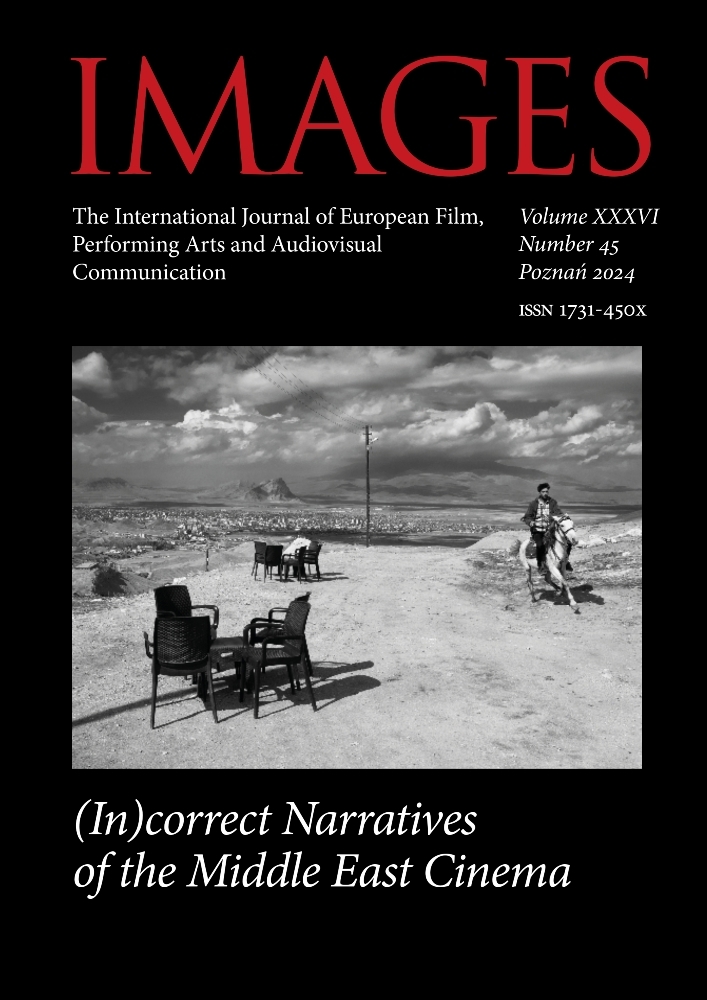Abstrakt
This article explores Palestinian cinema’s fourth period of activity that began around 1980. During this time, the world did not acknowledge the existence of the Palestinian people and their territory. Palestinian cinema thus emerged as a tool to create a national identity and voice, and to establish a continuous time and space that defined their history and territory. The films projected a collective consciousness that united the dispersed Palestinian community, creating a shared community. To achieve these goals, Palestinian cinema employed unique and complex artistic means, with its national purpose remaining consistent with its complex cinematic poetics. This bird’s-eye-view article highlights the shared spirit of the films and emphasizes the commonality beyond the differences. It offers an insight into the cinematic language that characterized this period and the principles that made Palestinian cinema a unique voice on the global stage.
Bibliografia
Anderson Benedict, Imaginary Communities: Reflections on the Origin and Spread of Nationalism, Verso, London and New York 1991.
Ben-Zvi Morad Yael, Borders in Motion: The Evolution of the Portrayal of the Israeli-Palestinian Conflict in Contemporary Israeli Cinema, [in:] Israeli Cinema: Identities in Motion, eds. Miri Talmon, Yaron Peleg, Texas University Press, Texas 2011, pp. 276–293. DOI: https://doi.org/10.7560/725607-021
Ben-Zvi Morad Yael, Patricide: Gender and Nationality in Palestinian Cinema (in Hebrew), Resling, Tel-Aviv 2011.
Ben-Zvi Morad Yael, Self-Sacrifice and Forgiveness: Religion and Nationalism in New Israeli and Palestinian Cinema, [in:] The Struggle to Define a Nation: Rethinking Religious Nationalism in the Contemporary Islamic World, eds. Marco Demichelis, Paolo Maggiolini, Gorgias Press, New Jersey 2017, pp. 221–249. DOI: https://doi.org/10.31826/9781463237257-010
Ben-Zvi Morad Yael, Track Changes: The New Wave of Palestinian Cinema in Israel, [in:] Israeli New Media Reader: Film, Television, Internet, eds. Yaron Peleg, Rean Kaplan, Ido Rosen, Texas University Press, Texas (forthcoming).
Bresheeth Haim, Telling the Stories of Heim and Heimat, Home and Exile: Recent Palestinian Films and the Iconic Parable of the Invisible Palestine, “New Cinemas: Journal of Contemporary Film” 2002, no. 1(1), pp. 24–39. DOI: https://doi.org/10.1386/ncin.1.1.24
Chakravorty Spivak Gayatri, Can the Subaltern Speak?, [in:] Marxism and the Interpretation of Culture, eds. Cary Nelson, Lawrence Grossberg, University of Illinois Press, Chicago and Urbana 1988, pp. 271–313.
Dabashi Hamid, Introduction, [in:] Dreams of a Nation: On Palestinian Cinema, ed. Hamid Dabashi, Verso, London and New York 2006, pp. 7–22.
Dao Salim, Salim Dao: A Word from the Director (in Hebrew), [in:] Eye to Eye: Documentary Film Seminar on the Subject of Conflict. Conference Proceedings, 1st June 2003, pp. 126–128.
Galili Doron, Palestinian Television (in Hebrew), seminar paper in the course “Space and Memories in the Palestinian Cinema”, lecturer: Nurith Gertz, Tel Aviv University, Department of Cinema and Television, 2001.
Gertz Nurith, Khleifi George, Palestinian Cinema: Landscape, Trauma, and Memory, Indiana University Press, Indianapolis 2008. DOI: https://doi.org/10.3366/edinburgh/9780748634071.001.0001
Hassan Nizar, A Letter from the Rest of the World or “The Afghan Arabs”, [in:] Dreams of a Nation: On Palestinian Cinema, ed. Hamid Dabashi, Verso, London and New York 2006, pp. 105–109.
Jameson Fredric, Third-World Literature in the Era of Multinational Capitalism, “Social Text” 1986, no.15 , pp. 65–88. DOI: https://doi.org/10.2307/466493
Khalidi Rashid, A Universal Jubilee? Palestinians – 50 Years After 1948, [in:] Eye to Eye: Documentary Film Seminar on the Subject of Conflict. Conference Proceedings, 1st June 2003, pp. 34–38.
Kimmerling Baruch, Migdal Joel S., Palestinians: The Making of a People, Free Press, New York 1993.
Linor Irit, Anti-Semitism Now, Ynet, 7.02.2006, https://www.ynet.co.il/articles/0,7340,L-3211771,00.html.
Munk Yael, Between Algeria and Palestine: Some Thoughts on Political Cinema (in Hebrew), [in:] Eye to Eye: Documentary Film Seminar on the Subject of Conflict. Conference Proceedings, 1st June 2003, pp. 39–49.
Naficy Hamid, An Accented Cinema: Exilic and Diasporic Filmmaking, Princeton University Press, Princeton, New Jersey and Woodstock, Oxfordshire 2001. DOI: https://doi.org/10.1515/9780691186214
Yuval-Davis Nira, Gender and Nation, Sage London, Thousand Oaks, New Delhi 1997.
Licencja
Prawa autorskie (c) 2024 Yael Ben-Zvi Morad

Utwór dostępny jest na licencji Creative Commons Uznanie autorstwa 4.0 Międzynarodowe.

